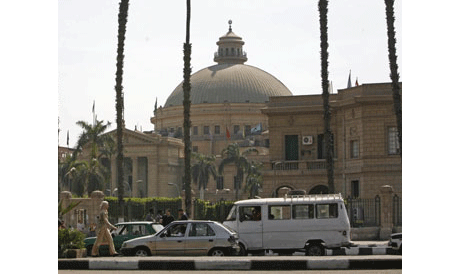
Cairo University (photo: Reuters)
“Drama and Democracy from Ancient Times Until the Present Day” was the topic of the 9th annual conference at Cairo University's department of Greek and Latin. Academics from Europe, the USA, Kuwait and Egypt delivered talks and held discussions on playwrights, writers and philosophers who had tackled the notion of democracy in their work.
Many speakers investigated the influence of iconic writers on later generations of thinkers. Topics such as tyranny, corruption, slavery, women and patriarchy were tackled in depth.
Some speakers concentrated on a detailed analysis of specific texts and characters as symbols of democratic notions and messengers of change. Others looked at the impact of ancient writers on modern thinkers.
The theme of the conference was the importance of democracy and freedom of expression in the development of theatre and dramaturgy.
Nicos Shaifkalis, director of the Cyprus Centre of the International Theatre Institute explained how democracy in Ancient Greece was established in parallel with the creation of Greek tragedy and emphasised the importance of dialogue in democratic societies. “In 5th century BC Athens, all citizens were informed through the theatre about public issues and discussed them openly the next day in the agora [assembly place].”
Mohammad Al-Mohanna of Kuwait's Higher Institute of Dramatic Arts noted that the 4th and 5th centuries BC were important stages in the history of Ancient Greek drama, pointing to the major annual drama festival, Dionysian. Al-Mohanna focused on the relationship between satyr (a form of tragicomedy, similar in spirit to burlesque) and tragedy. Both genres share similar characteristics yet are very different from each other. The existence of both genres indicates that Ancient Greek theatre validated freedom of expression by introducing two forms of drama which shared the same space but each expressed itself in a distinct way.
Hanaa Abd El-Fattah of Cairo's High Institute of Theatrical Arts demonstrated how drama and theatre cannot flourish without democracy and freedom of expression. Starting with the basic democratic concepts of 5th century BC Greek society, Abd El Fattah argued that lack of democracy is a key factor behind the poor state of Egyptian theatre over the last 60 years. Abd El-Fattah concluded that too few valuable propositions had occurred in the Egyptian theatre since the 1952 Free Officers coup. It also negatively impacted all Egyptian culture.
Egyptian playwrights borrowed tools from literature, such as symbolic and metaphorical thinking, to enable them to comment on social and political issues. “This was the only way to escape the censorship and express their thoughts without making direct statements. Playwrights used Arab literary heritage, including A Thousand and One Nights, old theatrical styles such as shadow theatre and Aragoz, in order to use them as masks covering the core issues of freedom, independence and democracy,” Abd El-Fattah explained.
“Today, we need a proper assessment that explains the difference between pure representations of the literary heritage versus writers’ individual and original creativity transferred through those works. It is evident that Egypt is still waiting for the big writers and literary ideas to surface. Egyptian theatre is in need of a text that would creatively encompass the new energies that erupted with the revolution,” he concluded.
Short link: